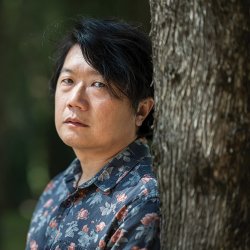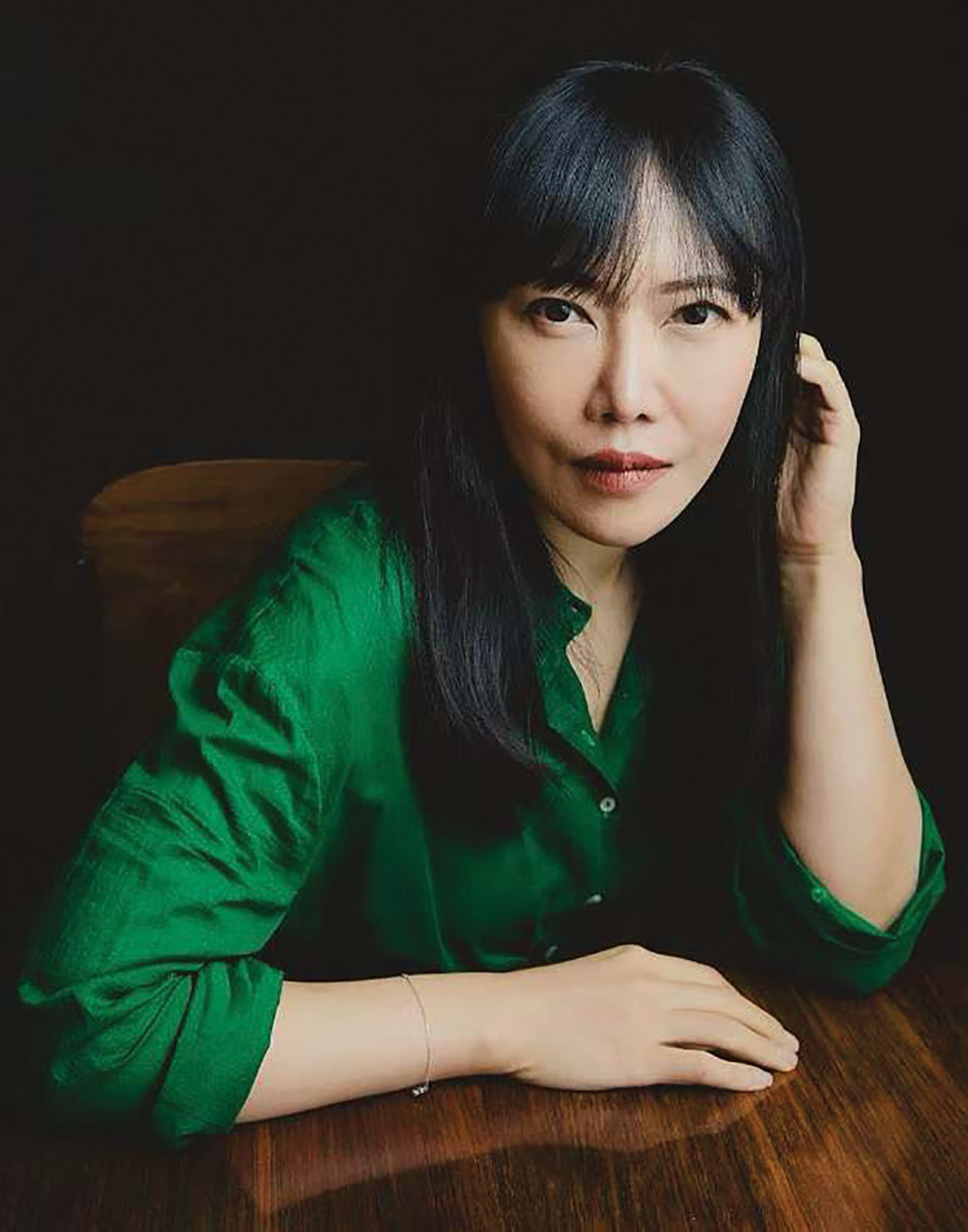It’s time to get excited about reading Chinese fiction, and Zhang Yueran and Jeremy Tiang are two of the biggest reasons why.
Zhang is part of a new generation of Chinese writers, born into a period of both economic stability and cultural change, whose writing captures the tensions between urban and rural life and the impact of generational trauma. In her thought-provoking Women, Seated, translated by Tiang and the first release from a new initiative from Riverhead Books to bring contemporary Chinese fiction to American audiences, Zhang addresses gender, politics and status from the perspective of a young nanny from the rural provinces working for a wealthy Beijing family that is under investigation for fraud.
Despite the 13-hour time difference between Beijing and Nashville, BookPage was lucky enough to catch up with Zhang and Tiang via Zoom (where the two were joined by Zhang’s green-eyed cat, Tuantuan) to discuss friendship, writing and why we should seek out literature in translation.

Though they’re from Singapore and China, respectively, Tiang and Zhang met in the United States in 2011 when both were enrolled in the University of Iowa’s International Writing Program, which connected more than 30 writers from around the globe and brought international literature into American classrooms. The program also encouraged students of literary translation to work one-on-one with writers. Tiang says, “We were both there to work on our own writing, but Yueran gave me some of her books in Chinese and mentioned that they hadn’t been translated, and I thought, well, we’ve got three months together. Why shouldn’t I try translating some of these?” After the residency, they kept working together and Tiang translated her novel Cocoon, about childhood friends whose relationship is profoundly affected by their grandparents’ roles in the Cultural Revolution.
Before enrolling in Iowa, Zhang had spent five years in Singapore studying computer science. When she and Tiang met, she says, laughing, “At first, we just complained together about Singapore. But then we moved on to literary topics and found we had a lot to share.”
The obvious camaraderie between Zhang and Tiang spills over into their work, and both remark on the isolation of writing versus the companionship found in working on translations. Sometimes they even bounce ideas off of one another. “I enjoy discussion very much,” Zhang says. “I think I am a better writer when I get his input. It’s like a reward for all the work I’ve done alone. But you have to know the right moments to show a text to someone and get feedback, and when you just have to go away and solve problems on your own. I’m always learning what that balance is.”
Tiang agrees. “I think about writing as a solo act, but there is a kind of collaboration that you have when you’re working with someone as a translator. It’s a real treat for me that I was able to see drafts of Women, Seated before it was finished. I’d seen the construction of it, and I knew it really well. Just seeing how the story came together and talking with Yueran as a reader—how I felt about it, what I didn’t understand, what I really loved—was part of the process.”
“It’s really a novel about women being brought together by a political situation that’s beyond their control.”
It was a shorter, unpublished version of Women, Seated that caught the eye of Riverhead editor Han Zhang, a Mandarin speaker. Han Zhang enjoyed it so much she reached out to see if the author would be willing to rework it into a longer form.
“I hadn’t read it for several years after I finished it,” Zhang explains, “and I didn’t publish it in China because I was not satisfied with the ending. After I spoke to Han Zhang, I read it again and this time I found a new character who was hidden in the story. I thought, wow, she should be on the stage, and she could play an important role in the ending.”
This character is Qin Wen, the matriarch of the house, and enlarging her role “really changed the nature of the story,” Zhang says. It is through the relationship between Qin Wen and her nanny, Yu Ling, that the novel’s depth and intrigue really sharpen. The privileged Qin Wen has everything she wants, but is unhappy about the lack of attention given to her art, which is in the style of American portraitist Alice Neel. She’s also jealous of the easygoing bond between her son, Kuan Kuan, and Yu Ling, but for the nanny, any happiness she finds in her relationship with the boy is shadowed by the pressures that keep her in her position, including mysterious events in her past that prevent her from returning to her village.
“It’s really a novel about women being brought together by a political situation that’s beyond their control,” Zhang says. “Using these different women living in Beijing, the big city, compared to the smaller villages, allowed me to express ideas about being a Chinese woman clearly and in a profound way.”
The road to literature for both Tiang and Zhang started in childhood. Both were avid readers as kids, and Zhang wrote her first story as a teenager. Tiang, on the other hand, started in drama. He says, “I trained as an actor and then from there I started writing plays. I was living in the U.K. at the time. At a certain point, I kept reading interviews with fiction writers where they said the hardest thing about writing fiction is dialogue. But I’m a playwright: That’s all I do, is dialogue. So I wrote a short story, just to see what would happen, and it won a short story competition in Singapore with a substantial prize, $10,000. That was enough for me to live on for a while and I used that time to write my first novel.” As someone who writes in English and also loves Chinese fiction, it felt like a logical progression for Tiang to become a literary translator. It was a “way to get right inside these books I loved so much, and connect with my Chinese heritage.”
“Why not be in conversation with the world?”
For Tiang, the act of translation is a multistep process. “I read the work a couple of times before I start,” he explains. “That’s when I start to get a sense of what the voice might be in English, areas where I might need to do additional research or ask clarifying questions. I’ll do the first round of translation then. And after that, I put the original away and work on it as an English text because it’s got to make sense to people who haven’t seen the Chinese. . . . If there’s a political or social situation unique to China, I want to give the reader the bare minimum of additional information so the story still flows. My final stage is to do at least one round of line-by-line editing, going against the original just to make sure I haven’t completely lost sight of it.”
The pleasure of reading Women, Seated lies in the development of the characters as the balance of power among them subtly shifts. Together, Zhang and Tiang give the reader enough information to understand the political climate without distracting from the story. Both say that it’s a common problem for translators to add too much, which can cause readers to approach the text as if it were a guidebook and not a piece of fiction. “The starting point has to be the narrative: Whose voices are these, and who are these characters?” Tiang says. “Any additional information, like certain elements about how class works or how the position of a nanny might be different in China than the U.S., if it is, has to be almost smuggled in.” Zhang adds that in China, going from a rural area to a big city like Beijing is as much a change as traveling to a different country. “But you don’t want someone finishing the novel and saying ‘I’ve learned so much about China from this book,’” she says. “I want them, as any writer would, to be absorbed by the story and the characters first.”
Though seeking out literature in translation might sound daunting, you’re probably already reading more of it than you think. Tiang and Zhang point out the wild popularity of translated novels like The Girl With the Dragon Tattoo and My Brilliant Friend. “Why not step into something that’s maybe a little less familiar?” Tiang says. “I think people are initially intimidated. But once you step in, there are all kinds of resonances and things are actually easier than you might expect. Women, Seated, for example. It’s a great story with very recognizable characters. After a while, or maybe right from the beginning, I would say you forget the cultural differences. But even more importantly, why not be in conversation with the world?”
Photo of Zhang Yueran © Cai Xiaochuan. Photo of Jeremy Tiang © Marco Giugliarelli for the Civitella Ranieri Foundation, 2024.
